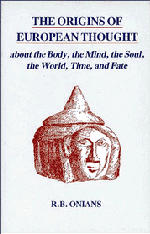Book contents
- Frontmatter
- Contents
- Preface to the first edition
- Preface to the second edition
- Introduction: The Earliest Greeks
- PART I THE MIND AND THE BODY
- PART II THE IMMORTAL SOUL AND THE BODY
- Chapter I The ψυχή
- Chapter II The Genius, Numen, etc.
- Chapter III Anima and Animus
- Chapter IV The Knees
- Chapter V The Strength
- Chapter VI The Stuff of Life
- Chapter VII River-Worship and some Forms of the Life-substance
- Chapter VIII The World: Beginnings of Greek ‘Philosophy’
- Chapter IX Death and Cremation
- Chapter X The Offerings to the Dead and to the Gods
- Chapter XI Nectar and Ambrosia
- PART III FATE AND TIME
- ADDENDA
- Indexes
Chapter XI - Nectar and Ambrosia
Published online by Cambridge University Press: 06 August 2010
- Frontmatter
- Contents
- Preface to the first edition
- Preface to the second edition
- Introduction: The Earliest Greeks
- PART I THE MIND AND THE BODY
- PART II THE IMMORTAL SOUL AND THE BODY
- Chapter I The ψυχή
- Chapter II The Genius, Numen, etc.
- Chapter III Anima and Animus
- Chapter IV The Knees
- Chapter V The Strength
- Chapter VI The Stuff of Life
- Chapter VII River-Worship and some Forms of the Life-substance
- Chapter VIII The World: Beginnings of Greek ‘Philosophy’
- Chapter IX Death and Cremation
- Chapter X The Offerings to the Dead and to the Gods
- Chapter XI Nectar and Ambrosia
- PART III FATE AND TIME
- ADDENDA
- Indexes
Summary
What was ambrosia? Bergk and Roscher with Gruppe and other scholars following them have explained that it was the early interpretation of wild honey. But against this there are many reasons. Wild honey, which is in point, must have been familiar from immemorial antiquity to the Indo-European peoples and it has its own names. The same holds for non-Indo-European peoples in the Mediterranean basin. Ambrosia, unlike such honey, is the stuff of immortality and is not available for men. Honey is freely eaten by mortals. It is stored in vessels and used by the Homeric warriors as a normal article with cheese and wine. So too beeswax. Odysseus had a ‘huge wheel’ of it on board. So far from being thought to belong peculiarly to the gods, honey is not offered to them or associated with them in any way in either Homer or Hesiod. Wernicke, arguing that ambrosia is food, asks, ‘What else can it be but a kind of bread?’ But against this there are the same objections; and ambrosia is used in ways unthinkable for anything bread-like. The adjective ἀμβρόσιος shows that ἀμβροσία was expressive of immortality. It is, like αἰών, concrete, the stuff of immortal life. Putting wine and nectar on one side for the moment, what in fact was the stuff of life, as the earliest Greeks conceived it, and what did they think was the proper nourishment for the gods?
- Type
- Chapter
- Information
- The Origins of European ThoughtAbout the Body, the Mind, the Soul, the World, Time and Fate, pp. 292 - 300Publisher: Cambridge University PressPrint publication year: 1988



